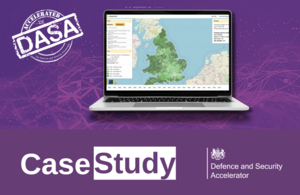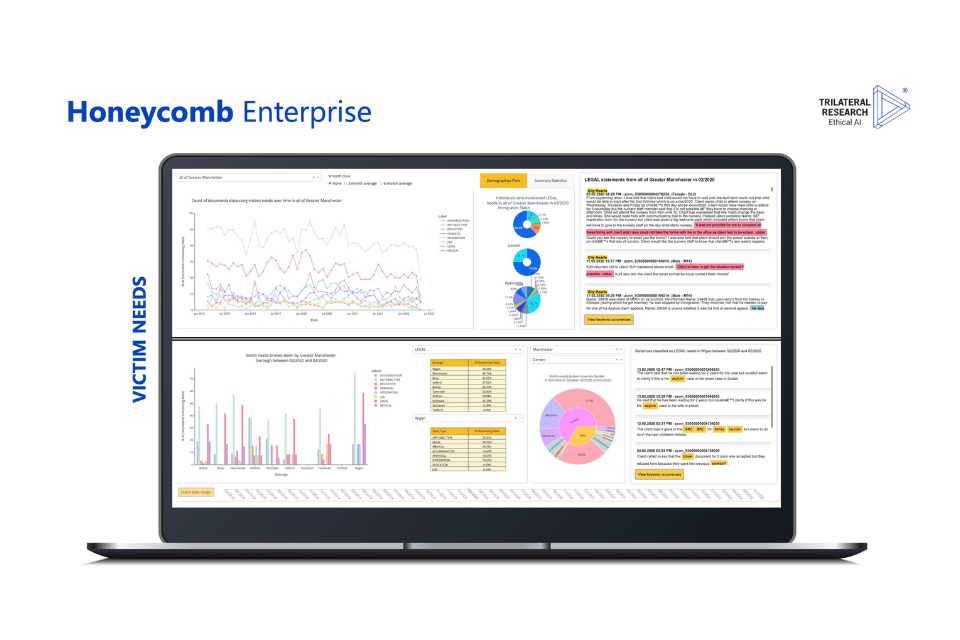DASA funding helps drive ethical artificial intelligence community safeguarding application from proof of concept to product launch
Trilateral’s artificial intelligence web application helps organisations better understand and respond to crime

- London-based SME, Trilateral Research, has developed an ethical AI application called Honeycomb that can help organisations make sense of human behaviour and case data to quickly implement safeguarding measures for crimes such as human trafficking
- Funded through the DASA Open Call and Security Rapid Impact, Trilateral’s innovation will launch in April 2023
- DASA has supported Trilateral from proof of concept, through to product launch, helping Trilateral reach a faster route to market through the Rapid Impact Open Call
Explainable AI to help understand human terrain and case data and solve crime
Artificial intelligence (AI) is growing in adoption, complexity and fidelity, and more organisations are turning to AI to expedite analysis at scale. While AI can make complex analysis and decision making more straightforward for human users, it is vital to understand how AI functions.
AI explainability builds trust in the ability of AI to aid responsible decision making in sensitive areas where transparency is key, such as human trafficking, child protection, organised crime, and healthcare. This helps users understand AI output, avoid bias, maintain high standards and ensure AI outcomes can be challenged or reviewed.
Introducing Trilateral Research’s explainable AI web application
With the help of DASA funding, London-based SME, Trilateral Research, has developed an explainable AI web application called Honeycomb, which will launch in April 2023. It is designed to enable organisations to better understand and respond to complex societal issues, such as human trafficking, to make more informed decisions quickly.
Trilateral Research built the AI application on a suite of Natural Language Processing (NPL) tools which are used to extract, communicate, and expedite the analysis of crime case content, such as text, databases, documentation and case notes. The NPL tool highlights patterns, trends, key themes and topics of interest, and fast tracks findings back to analysts and intelligence officers for validation. This helps human users enhance their professional judgement to review cases quickly and implement safeguarding interventions.
Trilateral’s AI web application was developed alongside in-house subject matter experts in areas such as human trafficking and criminology to ensure the NPL technology had a strong understanding of the domain, resulting in enhanced validly of output.

Trilateral's Honeycomb Enterprise technology
Making sense of structured data for criminal investigation
Trilateral’s solution can analyse a huge amount of structured case data and expedite findings in several hours, when compared to a human analyst which could take weeks.
Trilateral’s innovation helps defence and security in several ways:
- Patterns, trends, key themes, topics detection: The AI web application can quickly trawl through mountains of case data to find information relevant to a case.
- Geospatial and human terrain data: The tool utilises geospatial analysis and can visualise structured data that relates to the wider human terrain.
- Fast tracked analysis: Enables human analysts and intelligence officers to obtain results faster and with a wider variety of data, within several hours instead of days.
- Easy to understand data: The innovation is easy to use and digest, enabling users beyond the analyst, such as senior decision makers, to understand the analysis.
- Human aiding: Ensures analysts and intelligence officers can focus more on value adding tasks, rather than time intensive data analysis.
DASA support from proof of concept to product launch
DASA funding and engagement has helped Trilateral steer the direction of the product to achieve a faster route to market through the defence and security sector.
The SME had initially developed the innovation to help Defence better understand unconventional societal issues such as the risk of human trafficking, cultural property protection, gender-based violence and child exploitation in conflict situations. Trilateral first engaged with DASA in 2018 where they delivered a proof of concept for a risk assessment tool to help the UK military to assess the risk of modern slavery and human trafficking in conflict situations.
Their next funded DASA project, HAMOC, was submitted in 2019, which sought to develop AI tools to equip defence with the capability to effectively integrate human security analysis into its existing planning functions. Leveraging feedback from DASA, Trilateral steered the direction of HAMOC, towards a continued security focus to meet rapid engagement opportunities.
Trilateral successfully submitted their next project to the DASA Security Rapid Impact Open Call in 2021, to develop explainable AI to extract and communicate insight from existing databases to help police combat child exploitation and organised crime through advance organised crime group mapping. As part of trialling, Trilateral are collaborating with a UK police force, helping them make better use of their data, successfully showing how the tool can be used to implement safeguarding measures months ahead of their standard timelines.
All of this work fed into the development of Honeycomb which is due to launch in April 2023.
Dr Hayley Watson, Director, Sociotech Innovation at Trilateral Research said:
DASA provided us the space and time to innovate and co-design with defence users, which enabled our development of sociotechnical methods for building ethical AI to combat complex societal problems. The opportunities for defence and security end users are huge, working together, we can offer the capability to harness explainable AI to combat complex societal problems from national security to crisis and conflict stabilisation efforts. We look forward to continuing to work with those keen to leverage innovation to enhance their operations and ultimately, help save lives.
What’s next for Trilateral
Through successful funding, testing, and trialling with DASA, Trilateral has gained confidence in engaging with defence and security customers, which has in turn built credibility for their product.
DASA has helped provide an outlet for Trilateral to test the market, foster a large network of product champions and potential customers, and steer the direction of their product towards a security focus for rapid pick up. Looking into the future, Trilateral hopes to build on their product launch by further developing tools to integrate more directly with customer systems via application programming interface feeds and data migration tools, and develop even more creative solutions for explainable AI.